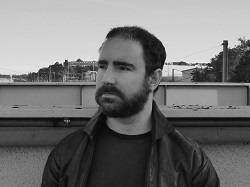Email: a.ossa-richardson@ucl.ac.uk |  |
Education and Experience
Anthony Ossa-Richardson studied philosophy at Bristol (BA), Renaissance literature at York (MA), and intellectual history at the Warburg Institute (Ph.D., 2011). He worked for a year as a research assistant on the manuscript notebooks of Sir Thomas Browne, then held a Leverhulme Early Career Fellowship at Queen Mary University of London. In 2015 he joined the English department at the University of Southampton, before coming to UCL in 2019.
Research Interests
Anthony is primarily interested in the expression of ideas in literature—a category including critical, philosophical and historiographical writing—and in the negotiation of meaning by its readers. His research encompasses a range of periods and disciplines—he has published on the satirist Thomas Nashe, the Elizabethan poet Sir John Davies, John Taylor the ‘water poet’, Alexander Pope, Marcel Proust and William Empson, but also on pagan religion, Renaissance humanism, the Hafsid sultan Muley al-Hasan, biblical scholarship and translation, the science of sneezing, the crystallised tears of Christ, eighteenth-century metafiction, Victorian demonology, the origin of dramatic irony, universal language schemes, the limits of allegory, postwar British architecture and the colonial study of African history. His most recent monograph, A History of Ambiguity, is an account of the ways in which readers and critics from antiquity to the twentieth century posited, denied, conceptualised and argued over the existence of multiple meanings in texts; it covers ten interconnected episodes in law, literary criticism, philosophy, rhetoric and biblical exegesis.
In March 2023, Penguin Classics will publish Anthony’s translation (co-authored with Dr Richard Oosterhoff at the University of Edinburgh) of the earliest book about Africa printed in Europe, The Cosmography and Geography of Africa, by the Moroccan diplomat al-Hasan al-Wazzan, better known as Johannes Leo Africanus. This work was written in Italian in the 1520s and first published in 1550; the new translation will be the first version in any language to return to the original manuscript of 1526.
Anthony is currently working on two long projects with several underlying themes in common. The first is an intellectual history of British architecture, 1945–1966, exploring an array of new efforts to create meaning in lieu of a vocabulary of historical forms; it wrestles both with the spectre of the ‘literary’ and with the development of a quasi-literary ‘criticism’ of architecture inspired above all by T. S. Eliot. The second is a book on the problem of typicality and atypicality, characterisation and the use of sources in Elizabethan literary and paraliterary works. Both projects address Anthony’s principal current preoccupation, namely, the challenge posed by particulars (e.g., items of outstanding or atypical interest) to the writing of history, literary or otherwise.
Books
Johannes Leo Africanus, The Cosmography and Geography of Africa, trans. Anthony Ossa-Richardson and Richard Oosterhoff (Penguin, 2023).
A History of Ambiguity (Princeton, 2019)
Et Amicorum: Essays on Renaissance Philosophy and Humanism in Honour of Jill Kraye, eds Anthony Ossa-Richardson and Margaret Meserve (Brill, 2018)
The Devil's Tabernacle: The Pagan Oracles in Early Modern Thought (Princeton, 2013)
Recent Articles and Chapters in Books
‘The Disappearance of Leo Africanus: Rival Repertoires of Historical Scholarship in the Mid-Twentieth Century’, English Historical Review (forthcoming, 2023)
(ed. and trans. from German) ‘English Architecture in 1963: A Newly Discovered View from Germany’, Architectural Research Quarterly 26.4 (forthcoming, 2022)
(ed. and trans. from French) César de Missy, ‘A Discourse on the Use of Ridicule in Religious Disputes’, Erudition and the Republic of Letters 7 (2022), 137–95.
‘Language, Poetry and Rhetoric’, in The Bloomsbury Cultural History of Ideas:1450–1650 (Bloomsbury, 2022), 143–63.
‘Proust, Typical Novelist: Literary Context as Type’, Modern Language Quarterly 81.2 (2022), 27–55.
‘The Phonostate at the End of History: Language, Nation, and a Scheme for World Peace in Edwardian South Africa’, Modern Intellectual History 19.4 (2022), online since 2021.
‘John Taylor Retailored’, Review of English Studies, 73 (2022), 59–77.
‘Known Unknowns: Sir John Davies’s Nosce Teipsum in Conversation’, English Literary Renaissance 51.3 (2021), 383–408
‘Allegory, Ambiguity, Accommodation', in Allegory Studies: Contemporary Perspectives, ed. Vladimir Brljak (Routledge, 2021), 128–45.
'Pseudohistory and Metafiction in the Eighteenth Century', in Antiquity and Enlightenment Culture: New Approaches and Perspectives, eds Felicity Loughlin and Alexandre Johnston (Leiden: Brill, 2020), 19–40.
 Close
Close

